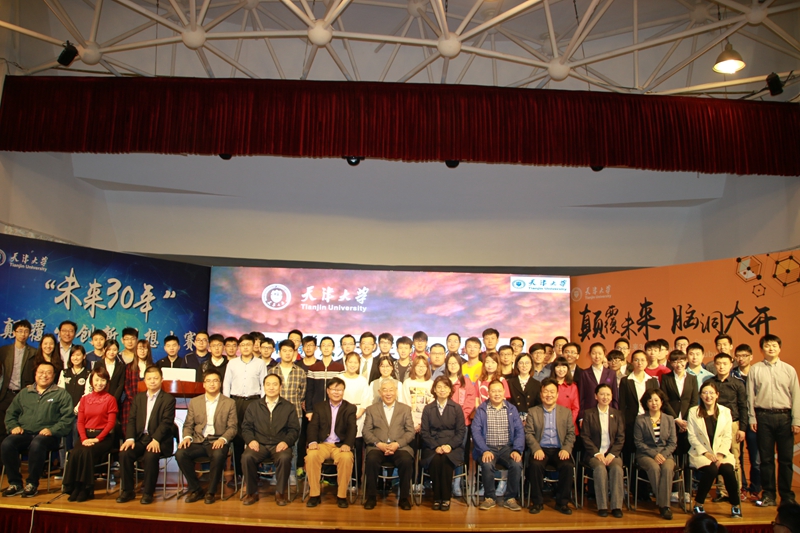
It is neither a science fiction film nor a daydream: transforming Mars into a liveable planet, reading people's consciousness like reading a U disk, or dressing a submarine in a shark skin coating. Those creative ideas were proposed by students, who had just-finished the first Subversive-Innovation-Imagination Contest for “the Next 30 Years” at Tianjin University (TJU). Each proposal was required to be reasonable, achievable and feasible. Yuan Yingjin, the Vice President of TJU and the sponsor and the advocate of the contest said: “This contest emphasizes ‘subversiveness’ and ‘writing a script’ for the future and encouraging cross-disciplines and joint participation of both the faculty and students”.
TJU is the first university nationwide to host the Subversive-Innovation-Imagination contest, setting a platform that is different from the traditional science and technology competitions for students. The theme of the competition is relevant to “6+X” fields including materials, information, biology, energy power, aerospace, ocean, and interdisciplinary fields, which world science and technology workers focus on. It’s the dream human society is eager to achieve and is the core part of the "13th Five-Year" development plan of TJU. Original works are needed in projects which do not coincide with existing scientific and technological achievements and the subjects of tutors. The traditional training model is changed from “teachers guiding students” to” students leading” to motivate strategic innovation which may overturn the traditional scientific thinking over the next 10-30 years and have revolutionary impacts on the national economy and social development.


After explaining the principles of the project, 2014 doctoral student Jiang Shenglong from the School of Precision Instrument and Opto-electronics Engineering used a popular analogy to illustrate his entry: "It’s like installing a U disk in the brain to read the brain information at any time. In the future we will be able to create people with super-sensory motor skills, or provide services for the disabled. "
Yang Fufu’s team from the School of Mechanical Engineering submitted a project called the "Extendible Satellite". Yang Fufu and his partners explained their innovation, saying: "Under the premise of retaining small size during the launch of the small satellite, in order to overcome its weakness such as single function and short service cycle, we can make them capable of extending, which can mean small size during the launch and larger space in the track and enough room for solar cells". Their theory is based on numerical simulation methods of motion coordination matrices.

TJU "sets the stage" for the students to "perform" in front of Academicians and renowned professors serving as the judges. Professor Su Wanhua, an Academician of the Chinese Academy of Engineering, and engineering expert on internal combustion engine power at Tianjin University led a team composed of twelve scholars from various fields from both inside and outside TJU to score and comment on each project. The judges not only gave positive appraisals for the players’ bold innovation, but also suggested they research and study systematically the feasibility of each project. Students received encouragement and enlightenment from the comments of judges, such as: "I think your idea is good, but still lacks basic theoretical support" and, "I am pleased to see you are interested in the transformation of the Martian environment and I hope your program will be more specific and targeted ".
This "high profile" review is both a pressure and a driving force for the students. Xu Zhimeng, a 2014 undergraduate at TJU, put forward a project on the “Biometric Transformation Strategy of a Martian Liveable Environment”. Xu said, “This project is my own idea. Without an instructor, I was lacked confidence and couldn’t figure out how to solve the problems. The comments of the judges suddenly opened my mind.”
Since the launch of the competition on October 9 last year, more than a thousand faculty members and students have participated in this competition. After six months’ incubation training, 24 projects were selected to enter the finals and ten of them stood out and won first prizes. These projects were not only innovative but also matched social development needs, which reflected the students’ care for the country and their sense of responsibility. Yuan Yingjin, Vice President of TJU and Lei Ming, TJU Deputy Party Secretary attended the display of the entries and expressed their encouragement, hope and expectation.

Yuan Yingjin said to the students: “in my opinion, there is not much difference between the eleventh and the top ten entries. All projects are students’ good ideas which TJU will support in other ways. I hope students can continue to focus on the forefront of science and technology development and national developmental needs and turn learned knowledge into achievements.”Lv Jing, the competition organizer and the Party Secretary of TJU Communist Youth League, expressed her willingness to forge the Subversive-Innovation-Imagination Contest for “the Next 30 Years” into the highest-rank students’ science and technology competitions and to keep holding it in future. In this way, the university will cultivate more students who have the courage for innovation and are able to be creative.
By: Fu Yuxuan, Wang Fang, Xu Hui
Editors: Sun Xiaofang and Ross Colquhoun






